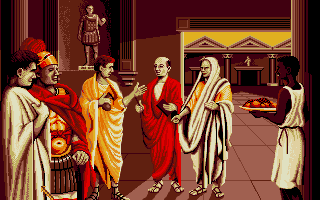Retro Replay Review
Gameplay
Caesar places you in the sandals of a Roman provincial governor, tasking you with transforming a modest settlement into a thriving urban center. From the outset, you’ll be laying down roads and zoning housing estates, meticulously planning water supply networks and sanitation systems to keep your citizenry content. The hands-on approach to urban planning is intuitive yet nuanced, demanding careful resource allocation to prevent bottlenecks and optimize growth.
(HEY YOU!! We hope you enjoy! We try not to run ads. So basically, this is a very expensive hobby running this site. Please consider joining us for updates, forums, and more. Network w/ us to make some cash or friends while retro gaming, and you can win some free retro games for posting. Okay, carry on 👍)
Slavery is woven into the mechanics, granting you a workforce that builds, farms, and maintains your city walls—though it also introduces ethical flavor and population dynamics. As your province prospers, taxation and public services become balancing acts: raise taxes too high and risk riots, skimp on infrastructure and watch your citizens’ morale plummet. Regular feedback via the in-game forums adds a layer of political theater, forcing you to justify your fiscal policies to the populace and, ultimately, to the Emperor himself.
Beyond civil management, Caesar integrates military strategy. Barbarian incursions loom on your borders, pushing you to raise legions, construct barracks, and train cohorts. While the base game auto-resolves battles with a simple report, owners of Cohort II can personally command troops in tactical skirmishes. This optional combat layer adds depth for strategy aficionados, though even without it, military readiness remains a constant strategic concern alongside city-building.
Progression comes in the form of increasingly challenging assignments: succeed in your first humble province, and you’ll be promoted to govern larger territories with more complex demands. Each scenario ups the ante—more demanding citizen expectations, aggressive barbarians, and tighter budgets—ensuring that no two playthroughs feel identical. The steady learning curve rewards patience, as mastery of logistics and diplomacy becomes vital for long-term success.
Graphics
For its era, Caesar showcases impressive isometric visuals, with beautifully rendered buildings that evolve from humble huts to grand temples and bustling forums. Each structure type features distinct animations, from the rhythmic chopping of timber at the lumber yard to the steady flow of water in aqueduct fountains. This attention to detail breathes life into the streets of your city, making each district feel unique.
Terrain manipulation is clear and functional: you can terraform hills, drain marshes, and carve out roads with visual feedback that feels both responsive and aesthetically pleasing. The color palette leans toward warm Mediterranean tones—sunlit terra-cotta roofs, bright green fields, and deep blue waterways—which helps evoke the historical setting without overwhelming the interface.
While modern players may find the resolution and sprite-based art dated, the overall presentation remains charming. Animations are crisp, and the city’s evolution—from sparse plots to dense urban sprawl—offers a satisfying visual progression. Submenus and icons are straightforward, albeit minimalist, ensuring that even newcomers can quickly interpret demographic charts, tax rates, and military statuses without being buried in text-heavy overlays.
Story
Caesar eschews a traditional narrative in favor of emergent storytelling driven by your decisions. You begin as a junior governor, receiving curt missives from Rome and instructions to expand your province’s economic and military might. These dispatches serve as loose narrative beats, guiding you through tutorial objectives before thrusting you into increasingly complex scenarios.
Interactions with your citizens, delivered via periodic forum posts, add dramatic flair. A disgruntled merchant might decry high taxes in one post, only for a jubilant artisan to praise your new public baths in the next. This ebb and flow of opinion creates a tapestry of community voices that feel surprisingly alive, offering both narrative context and practical feedback on your governance style.
Barbarian threats and imperial expectations provide external pressures that shape your story. Will you funnel resources into the legions to repel invasions, or focus on public works to keep the populace content? Every choice influences your reputation with Rome’s elite, leading to promotions—or demotions—in the campaign’s ladder of challenges. Though there’s no branching plotline in the modern sense, the combination of civic management and military duty crafts a personalized tale of rise, struggle, and potential glory.
Overall Experience
Caesar remains a standout in the city-building genre, offering a deep simulation that balances civic planning, public relations, and military strategy. Its learning curve encourages experimentation, rewarding players who invest time in understanding the intricate interplay between taxation, services, and defense. The scenario-based structure keeps objectives clear while allowing for open-ended creativity in city design.
The game’s replayability is high: different provinces come with unique starting conditions, resource distributions, and threat levels. Veterans will find themselves revisiting early scenarios to perfect their tax strategies and logistical networks, while newcomers can relish the step-by-step tutorials embedded in the first few assignments. The optional Cohort II integration further extends longevity by providing hands-on tactical combat for those who crave battlefield agency.
Though Caesar’s graphics and interface reflect its early ’90s heritage, its core gameplay remains timeless. Fans of historical strategy will appreciate the authentic Roman ambiance, from the architectural styles to the citizen feedback loops. The soundtrack—featuring stirring choral motifs and ambient horn calls—enhances the immersion, transporting you to the heart of the Empire.
In sum, Caesar delivers a rich, multifaceted experience that challenges both your logistical acumen and your political savvy. Whether you’re meticulously zoning residential blocks, negotiating tax rates to stave off revolt, or marshaling legions against northern tribes, the game offers a rewarding simulation of ancient Roman governance. For strategy enthusiasts seeking depth and historical flavor, Caesar stands as a venerable classic worth building upon.
 Retro Replay Retro Replay gaming reviews, news, emulation, geek stuff and more!
Retro Replay Retro Replay gaming reviews, news, emulation, geek stuff and more!









Reviews
There are no reviews yet.